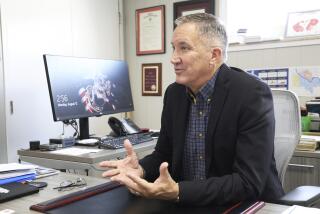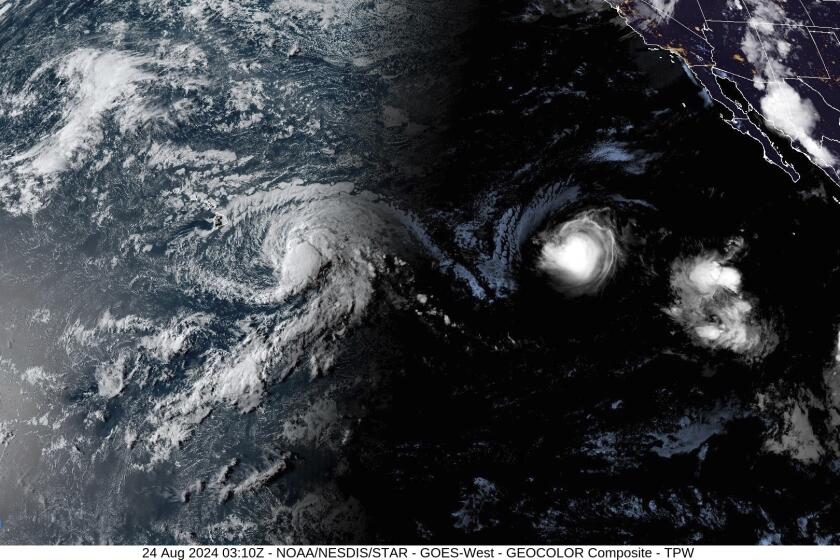A Recovery That Is Best Explained as a Miracle
A woman’s body on a gurney is rolled down a hallway, toward an exit, toward a beam of light. The woman is not dead. The woman is very much alive.
Her family is beside her, behind her, around her. The older daughters are 5, 4 and 3. Two tug at their father’s T-shirt while they walk. The younger girls--twins--ride in a blue double-baby stroller, steered by their dad. They are 6 weeks old.
Doctors trail them down the hall. Nurses wave, wishing the 25-year-old woman goodbye and good luck.
Some are crying. No one--not her priest, not her sister, not a soul--expected to ever see Maria Lydia Hernandez Lopez wave back.
Even the clinical social worker, Darlene Reed, is crying, squeezing Maria’s hand.
Everyone stops, just before the door.
They say a little prayer.
Dr. John Frazee, a neurosurgeon, a man as amazed as anyone over Maria Lopez’s being alive, bends to speak softly to her.
“Can you wave for me?” he asks.
He means outdoors, when they emerge into a bright sunlight that Maria hasn’t seen for so long.
She nods.
The doors open. Antonio Lopez leaves first, pushing and pulled by his girls.
On the gurney, bedcap over black hair, a breathing tube dangling beneath her chin, Maria Lopez is pushed outside to the UCLA Medical Center’s patient drop-off zone, lucky to be alive. She lifts her right arm and waves.
*
Helicopters are overhead, leaving and landing, drowning out Sylvia Hernandez as she speaks about her sister.
“Three months ago,” she says, “we never thought we would reach this day. We’re so happy my sister is finally going to come home. We want to thank Dr. Frazee, and thank Darlene for helping us through this very difficult situation, and give thanks to everyone for their prayers. God bless you all.”
A man asks, “Sylvia, when did you first begin to think your sister was going to be all right?”
“Probably when we were reading her the last rites,” Hernandez replies.
The contradiction isn’t lost on her.
Everyone in the hospital knew Maria Lopez was on her deathbed. She had arrived hemorrhaging from ruptured vessels to the brain. The condition is called arteriovenus malformation (AVM). Treatment at a San Bernardino hospital had already been unsuccessful, after Maria had slipped into a coma.
She had complained of a headache and nausea to Antonio, who phoned an ambulance. By the time they got from their Colton home to a doctor, the pregnant mother was unconscious.
“The first time she woke up was about three weeks later,” says Frazee, who began treating Maria after she was transferred to UCLA on April 24.
“It lasted only two or three days. Then she slipped back into the coma.”
That one lasted a month.
The AVM, which Maria was born with, was embolized with a glue-like substance to staunch the bleeding. But no more could be done. She wasn’t responsive.
Relatives were advised to stop life support. They agreed. A do-not-resuscitate order was issued at the hospital.
A priest came by on June 9, to administer the sacraments. Maria’s loved ones were in the room. So was her doctor, who, “for the 100th time,” as he puts it, raised a finger to see if Maria’s eyes would follow it, even imperceptibly.
They did.
Frazee had to make sure his own eyes weren’t deceiving him. He asked if Maria could nod. She did.
“We believe God touched her,” says Hernandez, who quit her job to stay by her sister’s side. “She wasn’t supposed to be here. To me, that’s a miracle. And only God can work miracles.”
A miracle?
“I don’t have a better explanation,” the doctor says.
*
Six days later, Maria gave birth, by caesarean section, to identical twins. A pediatric neonatologist, Dr. Susan Gray, cared and feared for the babies, who were seven weeks premature.
As for the mother, Gray says, “There was a lot of fear about losing her. She was in a very unstable condition.”
Briana and Arizandi Lopez are doing fine. They are at home with their father and Marisa, Blanca and Adahli, their big sisters.
Their mother is doing fine. Better every day. Her eyes are open. She is being taken to a Loma Linda rehab center, closer to home.
“Don’t be afraid,” Darlene Reed whispers.
Maria waves. She loves to wave.
*
Mike Downey’s column appears Sundays, Wednesdays and Fridays. Write to him at Times Mirror Square, Los Angeles 90053. E-mail: mike.downey@latimes.com
More to Read
Sign up for Essential California
The most important California stories and recommendations in your inbox every morning.
You may occasionally receive promotional content from the Los Angeles Times.






